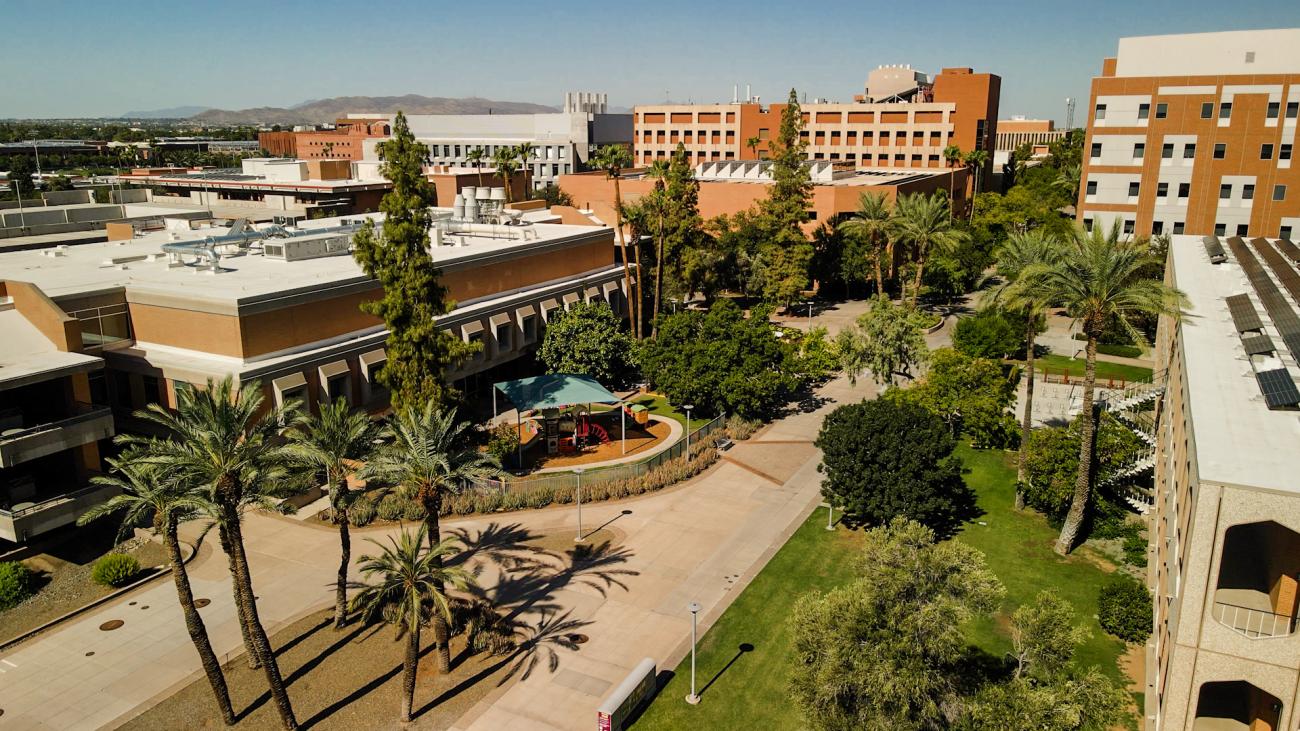
Evolutionary Social Psychology Co-Laboratory (Kenrick-Neuberg-Becker-Varnum)

The Evolutionary Social Psychology Co-Laboratory uses theory from evolutionary psychology to study a range of topics including: motivation, emotion, health and well-being, prejudice and stereotyping, aggression, sexuality and mating, friendship, leadership, economic decision making, cultural variation, and cultural change. The Co-Laboratory is a joint venture of four faculty members who collaborate on numerous projects and provide shared training for graduate students. More details of our work can be found on our individual websites: Doug Kenrick, Steve Neuberg, Vaughn Becker, Michael Varnum.
Lab Directors and Co-Principal Investigators:
Douglas T. Kenrick, PhD, President’s Professor, Psychology
Steven L. Neuberg, PhD, Foundation Professor, Psychology
D. Vaughn Becker, PhD, Associate Professor, Human Systems Engineering Program
Michael E. W. Varnum, PhD, Professor
Lab Affiliates:
Michael Barlev, PhD, Research Assistant Professor, Psychology
Current PhD Students:
- Tiffany Chin
- Kamryn Kadotani
- Arian Rajaeian
- Bernardo Seixas
- Maya Thamer-Nall
- Tianxing Zhang
Lab Alumni:
Joshua Ackerman (’07 PhD)
Professor
Department of Psychology
University of Michigan
Andrew Delton (’03 BS)
Associate Professor
Department of Political Science
Stony Brook University
Vlad Griskevicius (’08 PhD)
Carlson Family Foundation Chaired Professor of Marketing
Carlson School of Management
University of Minnesota
Amanda Kirsch (’25 PhD)
Senior Marketing Research Analyst
Travel + Leisure
Ahra Ko (’23 PhD)
Research Project Manager
Behavior Change for Good Initiative
Wharton School of Business
University of Pennsylvania
Jaimie Krems (’18 PhD)
Associate Professor
Department of Psychology
UCLA
Jung Yul Kwon (’22 PhD)
Post-doctoral Fellow
Department of Psychology
New School for Social Research
Jessica Li (’12 PhD)
Associate Professor
Department of Marketing
University of Kansas
Norman Li (’03 PhD)
Professor
Department of Psychology
Singapore Management University
Jon Maner (’03 PhD)
Professor
Department of Psychology
Florida State University
Rebecca Neel (’13 PhD)
Associate Professor
Department of Psychology
University of Toronto
Cari Pick (’21 PhD)
Research Scientist
Environmental Defense Fund
Angela Pirlott (’12 PhD)
Associate Professor
Department of Psychology
Xavier University
Theresa Robertson (’04 BS)
Assistant Professor
College of Business
Stony Brook University
Mark Schaller (’89 PhD)
Professor
Department of Psychology
University of British Columbia
Oliver Sng (’16 PhD)
Assistant Professor
Department of Psychological Science
UC Irvine
Jill Sundie (‘03 PhD)
Associate Professor
The Ernest Williams II School of Commerce, Economics, and Politics
Washington and Lee University
Joshua Tybur (’04 BA)
Professor
Department of Experimental and Applied Psychology
VU Amsterdam
Keelah Williams (’17 PhD)
Associate Professor
Department of Psychology
Hamilton College
Andrew White (’14 PhD)
Research Manager
Google
Alexandra Wormley (’24 PhD)
Post-Doctoral Fellow
Department of Psychology
University of Michigan
Select Recent Publications
Varnum, M. E. W., Kirsch, A. P., Beal, D., Pick, C. M., Al-Shawaf, L., Ambrosio, C., . . ., & Kenrick, D. T. (in press). Commonly observed sex differences in direct aggression are absent or reversed in sibling contexts. PNAS Nexus.
Götz, F. M., Montello, D. R., Varnum, M. E. W., Luca, D., & Kenrick, D. T. (2025). A unified framework integrating psychology and geography. Nature Human Behaviour. [Advance online publication]
Ko, A., & Neuberg, S. L. (2025). Ecological Affordances across Life Stages: An Affordance Management Framework. Behavioral and Brain Sciences. [Advance online publication]
Barlev, M., & Neuberg, S. L. (2025). Rational reasons for irrational beliefs. American Psychologist, 80, 79–90.
Ko, A., Neuberg, S. L., Pick, C. M., Varnum, M. E. W., & Becker, D. V. (2025). Responses to political partisans are calibrated by a COVID-sensitive disease psychology: A longitudinal investigation. American Psychologist, 80, 193–205
Sng, O., Williams, K. E. G., Tsukamoto, S., & Neuberg, S. L. (2025). Ecology stereotypes exist across societies and override race and family structure stereotypes. Journal of Personality and Social Psychology, 128, 243–261.
Hohm, I., Wormley, A. S., Schaller, M., & Varnum, M. E. W. (2024). Homo temporus: Seasonal cycles as a fundamental source of variation in human psychology. Perspectives on Psychological Science, 19, 151-172.
Varnum, M. E. W., Baumard, N., Atari, M., & Gray, K. (2024). Large language models based on historical text could offer informative tools for behavioral science. Proceedings of the National Academy of Sciences of the USA, 121, e2407639121.
Kirsch, A. P., Kenrick, D.T., Ko, A., Pick, C. M., & Varnum, M. E. W. (2024). Sibling aggression is surprisingly common and sexually egalitarian. Evolution and Human Behavior, 45, 214-227.
Wiezel, A., Barlev, M., Martos, C.R., & Kenrick, D.T. (2024). Stereotypes versus preferences: Revisiting the Alpha Male stereotype of leadership. Evolution and Human Behavior, 45, 292-308.
Wormley, A. S., Kwon, J. Y., Barlev, M., & Varnum, M. E. W. (2023). How much cultural variation around the globe is explained by ecology? Proceedings of the Royal Society B: Biological Sciences, 290. 20230485.
Pick, C., Ko, A., Wormley, A. S., Wiezel, A., Kenrick, D. T., Al-Shawaf, L., . . . & Varnum, M. E. W. (2022). Family still matters: Human social motivation across 42 countries during a global pandemic. Evolution and Human Behavior, 43, 527-535.
Pick, C. M., & Neuberg, S. L. (2022). Beyond observation: Manipulating circumstances to detect affordances and infer traits. Personality and Social Psychology Review, 26, 160–179.
Krems, J.A., Williams, K. E. G., Aktipis, C. A., & Kenrick, D.T. (2021). Friendship jealousy: One tool for maintaining friendships in the face of third-party threats? Journal of Personality and Social Psychology. 120(4), 977–1012.
Rotella, A., Varnum, M. E. W., Sng, O., & Grossmann, I. (2021). Increasing population densities predict decreasing fertility rates over time: A 174-nation investigation. American Psychologist, 76, 933-946.
Neuberg, S. L., Williams, K. E. G., Sng, O., Pick, C. M., Neel, R., Krems, J. A., & Pirlott, A. G. (2020). Toward capturing the functional and nuanced nature of social stereotypes: An affordance management approach. In B. Gawronski (Ed.), Advances in Experimental Social Psychology (Vol. 62, pp. 245 - 304). Cambridge, MA: Academic Press.
Kenrick, D.T., Cohen, A.B., Cialdini, R.B., & Neuberg, S.L. (2020). The science of antiscience thinking. Scientific American, Special Edition: Truth vs. Lies. 29, 84-89.
Ko, A., Pick, C. M., Kwon, J. Y., Barlev, M., Krems, J. A., Varnum, M. E. W., . . . & Kenrick, D. T. (2020). Family matters: Rethinking the psychology of human social motivation. Perspectives on Psychological Science, 15, 173-201.
Sng, O., Williams, K. E. G., & Neuberg, S. L. (2020). Sex-age stereotyping: Social perceivers as lay adaptationists. Evolution and Human Behavior, 41, 136-149.
Becker, V. D.., & Neuberg, S. L. (2019). Archetypes reconsidered as emergent outcomes of cognitive complexity and evolved motivational systems. Psychological Inquiry, 30(2), 59-75.
Moon, J.W., Krems, J.A., Cohen, A.B., & Kenrick, D.T. (2019). Is nothing sacred? Religion, sex, and reproductive strategies. Current Directions in Psychological Science. 28 (4), 361-365.
Sng, O., Neuberg, S. L., Varnum, M. E. W., & Kenrick, D. T. (2018). The behavioral ecology of cultural variation. Psychological Review, 125, 714-745.
Sng, O., Neuberg, S. L., Varnum, M. E. W., & Kenrick, D. T. (2017). The crowded life is a life: Population density and life history strategy. Journal of Personality and Social Psychology 111, 736-754.
Varnum, M. E. W., & Grossmann, I. (2017). Pathogen prevalence is associated with cultural changes in gender equality. Nature Human Behaviour, 1, 0003.
Williams, K. E., Sng, O., & Neuberg, S. L. (2016). Ecology-driven stereotypes override race stereotypes. Proceedings of the National Academy of Sciences, 113(2), 310-315.
Neel, R., Kenrick, D.T., White, A.E., & Neuberg, S.L. (2016). Individual differences in fundamental social motives. Journal of Personality and Social Psychology, 110 (6) 887–907.
Tybur, J. M., Inbar, Y., Aarøe, L., Barclay, P., Barlow, F. K., De Barra, M., Becker, D. V., ... & Žeželj, I. (2016). Parasite stress and pathogen avoidance relate to distinct dimensions of political ideology across 30 nations. Proceedings of the National Academy of Sciences, 113(44), 12408-12413.
Lab alumni Jaimie Krems has won an NSF Career Award!
Lab alumni Keelah Williams was granted tenure at Hamilton College!
Doug Kenrick won SPSP’s 2024 Book Award for his book Solving Modern Problems with a Stone Aged Brain!
Lab alumni Cari Pick won SPSP’s Student Publication Prize!
Lab alumni Jaimie Krems was granted tenure at UCLA!
Hear Michael Varnum discuss the many impacts of seasons on our minds and behavior on the BBC.
Lab alumni Becca Neel has received APA’s Distinguished Scientific Award for Early Contribution to Psychology!
Doug Kenrick has won the HBES Lifetime Career Award!
Lab alumni Oliver Sng was named an APS Rising Star!
Michael Varnum was named an APS Fellow!
Lab member Alexandra Wormley received NSF’s Graduate Research Fellowship!